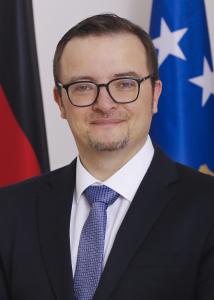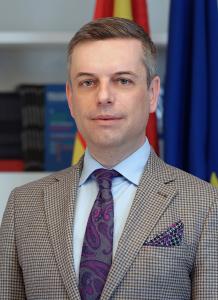At the workshop, the new innovation in online media were presented as are the tactics and best practices for attracting a larger audience. In addition, the copyright practices in online media and digital platforms in Germany were discussed as well as many current issues faced by media workers in this field.
At the workshop's opening, the Official representative of KAS, Daniel Braun, in the welcoming speech, shared his satisfaction with the cooperation with AJM and greeted the participants. ”When we talk about media security, on the one hand we are talking about technical security, about the opportunities we have to ensure that the things we consider to be serious journalistic sources deliver serious content and that they are not processed sources, misinformation. Today, there are many technical possibilities, so we need to have trusted sources. The second topic is copyright, the fee for text, photography. There is a great deal of debate on this topic in Germany and in the EU. You know that the big internet providers have a different idea from the smaller publishers and in this context, we should insist on professionalization of the media, i.e., to formulate solid rules. Topics that we support in Germany and in the world and here,” said Daniel Braun.
The President of AJM, Mladen Chadikovski emphasized the importance of the topic and pointed out ”With the cooperation with KAS, we try to build the capacity of our colleagues journalists and media workers engaged in the online media. Only through these kinds of workshops and trainings, we can practically see the essential issues in the context of new trends in the online media and the tools that are of great importance in terms of security and protection in the digital world“.
The workshop was led by Boris Ristovski, Web and Social Media Officer at the Macedonian Centre for International Cooperation (MCIC), while Marion Sandker, a lawyer and journalist, former Scholar of journalist promotion of Konrad-Adenauer-Stiftung, also had online engagements on the second working day and shared practical examples from Germany and talked about copyright practices in online media and digital platforms. Sandker stressed the importance of such events and current topics, which are of particular importance to journalists and the media but also to the lawyers and attorneys dealing with copyright and other related rights arising in the world of online media. Also mentioned was the Copyright and Related Rights Directive on the Single Digital Market, which regulates several issues, including certain forms of digital use and revenue sharing from the online distribution of copyrighted and related content. At the same time, it was shared how often copyright is encountered daily, the legal situation with the copyright in Germany was also presented, and the copyright law, definition of copyright, distinction between copyright and right of use, multiple use of text or image (online media, print media, appropriate compensation) and emphasis was placed on the contract with the publishing house, and it’s regulation. Also it was discussed about the licensing agreements (CC), different types of such agreements, EU copyright directive in the digital internal market, right to your own image (when you or part of you is on the image), and in which cases it can be used.
An interesting session had Dr. Christopher Nehring, Adenauer Fellows of the KAS Media Programme Southeast at University „St. Kliment Ohridski“ - Sofia who referred to the media and the secret services. He focused on mapping the complex relationship between the media, the secret services, and disinformation. ”Recently, a link has developed between the two parties of conflict and cooperation. There is more cooperation and similarity between the two sides than was generally assumed. Intelligence services today - at least in most Western democracies - are becoming more open and public, with PR and public relations playing an important role with the media. The national and normative context is crucial for the relationship: the more authoritarian political system and weaker rule of law, the more the relationship between the media and the intelligence services tends to confront and conflict. In democracies, the relationship between the media and the intelligence services is regulated by normative acts at both parties. Secrecy and confidentiality form the dividing line between the two institutions and between the two parties of confrontation/conflict and cooperation and similarity,” said Nehring.
The training was designed to cover two major topics: New trends in the informative online media - what are the tactics and best practices to attract a greater audience and Cybersecurity: Digital Anonymity, Privacy, and Security.
The training conducted by Boris Ristovski was organized in five sessions, two for the first topic and three for the second topic. During the sessions, a discussion was encouraged among the participants who shared their experiences, thoughts and views on the topics. At the same time, during the training, the participants shared a number of concrete examples inspired by everyday life. The aim was to maintain a balance between the theoretical basis and the practical use of the tools and recommendations proposed during the training. For the first topic, the focus was on developing a strategy to expand the reach of information not only on social media, but also on the use of other communication channels.
The second topic covered two aspects of cybersecurity: personal security and media security. Many free or affordable tools were shared with the participants for future use. Recommendations for future research and learning were shared at the end of each presentation. Some of the subtopics that were covered during the workshop: Audience profiling (Traffic sources, Demographics, Behaviour, Interests), Virtue vs Vice content, Readability index, Clickbait VS Attractive headline, UX/UI, SEO, User retention/loyalty, News aggregators, Social Media content, Research tools, Newsletters, Future news channels, and media, but also Common types of Cyberattacks; Password security; Two-factor authentication; The safest internet browsers, email providers, search engines, VPN, messaging apps; Protecting the devices, operating systems, and websites.
The implementation of this type of training is of particular benefit to media professionals to gain practical knowledge on how to improve the security of their digital platforms. Such events open the opportunity to discuss current challenges and share ideas for improving the situation in the online media in the country.
The three-day workshop, which took place from 24 to 26 March in Bitola, was attended by journalists from several online newsrooms from Skopje and from the regional centers of AJM. Experiences for the development of journalism in the online media were shared during the workshop, but it was also talked about the problems and challenges in the journalistic profession in this modern digital space.















